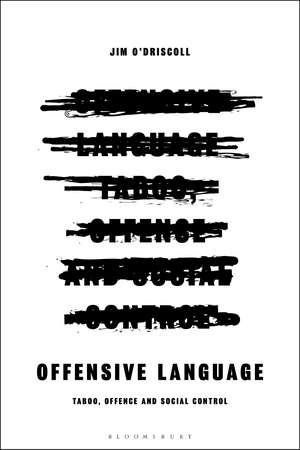Offensive Language: Taboo, Offence and Social Control
Autor Dr Jim O’Driscollen Limba Engleză Paperback – 18 mai 2022
| Toate formatele și edițiile | Preț | Express |
|---|---|---|
| Paperback (1) | 197.05 lei 43-57 zile | +72.12 lei 5-11 zile |
| Bloomsbury Publishing – 18 mai 2022 | 197.05 lei 43-57 zile | +72.12 lei 5-11 zile |
| Hardback (1) | 714.51 lei 43-57 zile | |
| Bloomsbury Publishing – 11 noi 2020 | 714.51 lei 43-57 zile |
Preț: 197.05 lei
Preț vechi: 257.48 lei
-23% Nou
Puncte Express: 296
Preț estimativ în valută:
37.71€ • 39.22$ • 31.13£
37.71€ • 39.22$ • 31.13£
Carte tipărită la comandă
Livrare economică 14-28 aprilie
Livrare express 07-13 martie pentru 82.11 lei
Preluare comenzi: 021 569.72.76
Specificații
ISBN-13: 9781350193321
ISBN-10: 1350193321
Pagini: 214
Dimensiuni: 156 x 234 x 16 mm
Greutate: 0.3 kg
Editura: Bloomsbury Publishing
Colecția Bloomsbury Academic
Locul publicării:London, United Kingdom
ISBN-10: 1350193321
Pagini: 214
Dimensiuni: 156 x 234 x 16 mm
Greutate: 0.3 kg
Editura: Bloomsbury Publishing
Colecția Bloomsbury Academic
Locul publicării:London, United Kingdom
Caracteristici
Tackles issues of free speech, censorship and social control, which have global relevance, through a linguistic framework
Notă biografică
Jim O'Driscoll is Senior Lecturer in English Language & Linguistics at the University of Huddersfield, UK.
Cuprins
Part I. Offensive language and why it matters 1. Introduction 2. Theoretical and analytical apparatus Part II. Potential offence: Taboo language 3. Taboo language 4. Taboo words 5. Taboo reference 6. Taboo predication Part III. Actual offence: Case studies 7. Some more theoretical considerations 8. Offences against the person 9. Offences against 'the peace' - and social control 10. Threats to social harmony - and social control Part IV. Reprise 11. Reporting offensive language 12. Social control and free speech Notes References Index
Recenzii
The particular strengths of the book for language scholars lie in its discussions of and original contributions to taboo language theory.
Thought-provoking for students of linguistics and anyone interested in language in general.
The topic/remit of offensive language, as addressed in this book, is ambitious and broad-ranging. ... this text will provide a significant reference point for understanding, conceptualising and interrogating these issues, for linguists and non-linguists alike.
O'Driscoll both synthesizes and opens up the multi-disciplinary topic of offensive language. Thought-provoking and deep yet written in an engaging style, this is a book you will remember long after you have finished reading it.
In this timely volume, Jim O'Driscoll offers us a lucidly written, fascinating and thought-provoking trip into the various shades of offensive language. Based on theoretical depth and the analysis of riveting empirical data, the book is must-read for all those interested in impoliteness and its central concept of offence.
It is only human to sometimes take offence in our interactions with others. But in recent years the causing and taking of offence has become an increasing fixture of public life. In this volume, Jim O'Driscoll undertakes the first extended study of offence and provides a systematic basis for distinguishing between potential and actual offence. It is a must read for anyone interested in the role language plays in both interpersonal and public life.
Offensive Language presents a thorough analysis of intriguingly complex phenomena in a readable way. Embedded within the contemporary context of the criminalisation of offensive wordings, it offers a wealth of striking examples illustrating theoretical issues, methodological questions and terminological distinctions. Highly recommended reading for linguists and the lay public.
Thought-provoking for students of linguistics and anyone interested in language in general.
The topic/remit of offensive language, as addressed in this book, is ambitious and broad-ranging. ... this text will provide a significant reference point for understanding, conceptualising and interrogating these issues, for linguists and non-linguists alike.
O'Driscoll both synthesizes and opens up the multi-disciplinary topic of offensive language. Thought-provoking and deep yet written in an engaging style, this is a book you will remember long after you have finished reading it.
In this timely volume, Jim O'Driscoll offers us a lucidly written, fascinating and thought-provoking trip into the various shades of offensive language. Based on theoretical depth and the analysis of riveting empirical data, the book is must-read for all those interested in impoliteness and its central concept of offence.
It is only human to sometimes take offence in our interactions with others. But in recent years the causing and taking of offence has become an increasing fixture of public life. In this volume, Jim O'Driscoll undertakes the first extended study of offence and provides a systematic basis for distinguishing between potential and actual offence. It is a must read for anyone interested in the role language plays in both interpersonal and public life.
Offensive Language presents a thorough analysis of intriguingly complex phenomena in a readable way. Embedded within the contemporary context of the criminalisation of offensive wordings, it offers a wealth of striking examples illustrating theoretical issues, methodological questions and terminological distinctions. Highly recommended reading for linguists and the lay public.
